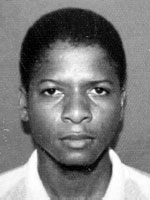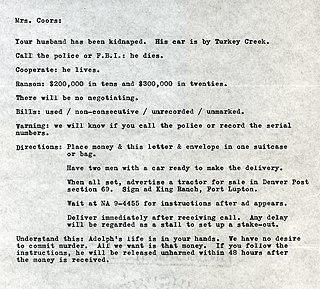Related Research Articles

Khalid Sheikh Mohammed, often known by his initials KSM, is a Pakistani terrorist and the former Head of Propaganda for al-Qaeda. He is currently held by the United States at the Guantanamo Bay detention camp under terrorism-related charges. He was named as "the principal architect of the 9/11 attacks" in the 2004 9/11 Commission Report.

José Padilla, also known as Abdullah al-Muhajir or Muhajir Abdullah, is a United States citizen who was convicted in a federal court of aiding terrorists.

Aafia Siddiqui is a Pakistani national who is serving an 86-year sentence at the Federal Medical Center, Carswell in Fort Worth, Texas, United States for attempted murder and other felonies.

Ahmed Khalfan Ghailani is a Tanzanian conspirator of the al-Qaeda terrorist organization convicted for his role in the bombing of embassies in Kenya and Tanzania. He was indicted in the United States as a participant in the 1998 U.S. embassy bombings. He was on the FBI Most Wanted Terrorists list from its inception in October 2001. In 2004, he was captured and detained by Pakistani forces in a joint operation with the United States, and was held until June 9, 2009, at Guantanamo Bay detention camp; one of 14 Guantanamo detainees who had previously been held at secret locations abroad. According to The Washington Post, Ghailani told military officers he is contrite and claimed to be an exploited victim of al-Qaeda operatives.

David Matthew Hicks is an Australian who attended al-Qaeda's Al Farouq training camp in Afghanistan, and met with Osama bin Laden during 2001. He was then detained by the United States in Guantanamo Bay detention camp from 2002 until 2007.

Mustafa Ahmed Adam al-Hawsawi is a Saudi Arabian citizen. He is alleged to have acted as a key financial facilitator for the September 11 attacks in the United States.

Extraordinary rendition is a euphemism for state-sponsored kidnapping in another jurisdiction and transfer to a third state. The phrase usually refers to a United States-led program used during the War on Terror, which had the purpose of circumventing the source country's laws on interrogation, detention, extradition and/or torture. Extraordinary rendition is a type of extraterritorial abduction, but not all extraterritorial abductions include transfer to a third country.

Moazzam Begg is a British Pakistani who was held in extrajudicial detention by the US government in the Bagram Theater Internment Facility and the Guantanamo Bay detainment camp, in Cuba, for nearly three years. Seized by Pakistani intelligence at his home in Pakistan in February 2002, he was transferred to the custody of US Army officers, who held him in the detention centre at Bagram, Afghanistan, before transferring him to Guantanamo Bay, where he was held until January 2005.
Iyman Faris is a Pakistani citizen who served for months as a double agent for the FBI before pleading guilty in May 2003 of providing material support to Al Qaeda. A United States citizen since 1999, he had worked as a truck driver and lived in Columbus, Ohio. As of September 2003, Faris was the "only confessed al Qaeda sleeper caught on U.S. soil." In 2003 he was sentenced to 20 years in prison for providing material support to Al-Qaeda. In February 2020 an American federal court revoked Faris' US citizenship. In August 2020, he was released from a federal prison in Illinois.
Operation Crevice was a raid launched by Metropolitan and local police in England on the morning of 30 March 2004. It was in response to a report indicating cells of terrorists of Pakistani origin operating in the Thames Valley, Sussex, Surrey and Bedfordshire areas, the source of which was said to be an interception of an instruction sent from Al-Qaeda leaders in Pakistan to militants in Britain. In March 2020 Jonathan Evans, Former Director General, MI5 gave an interview and citing one passage: 'The plot itself, however, appeared to be encouraged and fomented by al-Qa`ida in the tribal areas. It was one of the early ones we saw. It involved predominantly British citizens or British residents of Pakistani heritage, something which became something of a theme for this period'. The operation resulted in five men being found guilty in April 2007 of conspiring to cause explosions likely to endanger life.
Haroon Rashid Aswat is a British terrorist who has been linked to the 7 July 2005 bombings in London. American officials allege that he has ties to al Qaeda, and have sought his extradition to the United States, which is supported by the British government. After his internment in Broadmoor Hospital in 2008, in 2010 the European Court of Human Rights blocked efforts to extradite Aswat due to concerns over the conditions of his potential imprisonment in the United States. This decision was upheld on 11 September 2013, meaning that he can not be extradited while under treatment for paranoid schizophrenia.
Asif Iqbal is a British citizen who was held in extrajudicial detention as a terror suspect in the United States Guantanamo Bay detainment camps in Cuba from early 2002 to 9 March 2004.

Omar Mahmoud Othman, better known as Abu Qatada al-Filistini, is a cleric and Jordanian national. Abu Qatada was accused of having links to terrorist organisations and frequently imprisoned in the United Kingdom without formal charges or prosecution before being deported to Jordan, where he was acquitted of multiple terrorism charges.

Ahmed Omar Saeed Sheikh is a British Pakistani terrorist. He became a member of the Islamist jihadist group Harkat-ul-Ansar or Harkat-ul-Mujahideen in the 1990s, and later of Jaish-e-Mohammed and was closely associated with Al-Qaeda.
Rashid Rauf was an alleged Al-Qaeda operative. He was a dual citizen of Britain and Pakistan who was arrested in Bhawalpur, Pakistan in connection with the 2006 transatlantic aircraft plot in August 2006, a day before some arrests were made in Britain. The Pakistani Interior Minister, Aftab Ahmed Khan Sherpao, claimed that "he is an al Qaeda operative with linkages in Afghanistan". He was identified as one of the ringleaders of the alleged plot. In December 2006, the anti-terrorism court in Rawalpindi found no evidence that he had been involved in terrorist activities, and his charges were downgraded to forgery and possession of explosives. A 2022 article offers an assessment of the impact of Operation Overt and refers to Rauf's alleged role
The 2006 Cheetham Hill terrorism arrests was an anti-terrorism operation in the United Kingdom, in which Habib Ahmed, a taxi driver, was arrested by six policemen at his home in Cheetham Hill, Manchester on 23 August 2006 on suspicion of his involvement in a plan to attack on an individual.
Hassan Ghul, born Mustafa Hajji Muhammad Khan, was a Saudi-born Pakistani member of al-Qaeda who revealed the kunya of Osama bin Laden's messenger, which eventually led to Operation Neptune Spear and the death of Osama Bin Laden. Ghul was an ethnic Pashtun whose family was from Waziristan. He was designated by the Al-Qaida and Taliban Sanctions Committee of the Security Council in 2012.
An Egyptian resident of British Columbia, Essam Hafez Mohammed Marzouk arrived in Vancouver, British Columbia, Canada in 1993 as a refugee fleeing persecution in Pakistan. He was one of 14 people subjected to extraordinary rendition by the CIA prior to the 2001 declaration of a war on terror. Marzouk was the contact point for a bin Laden terrorist cell in Canada.
The D.C. Five is a group of Muslim Americans from the suburbs of Washington, D.C., with suspected ties to terrorism. The five men were detained on December 9, 2009, during a police raid in Pakistan on a house with links to a militant group. In part of an increasing trend in homegrown terrorism, they were in their late teens or early twenties.
Abdelhakim Belhaj is a Libyan politician and military leader. He is the leader of the Islamist al-Watan Party and former head of the Tripoli Military Council. He was the emir of the defunct Libyan Islamic Fighting Group, an anti-Gaddafi guerrilla group.
References
- 1 2 3 4 5 6 Duncan Gardham (18 December 2008). "Al-Qaeda terror trial: Rangzieb Ahmed was highest ranking al-Qaeda operative in Britain". The Daily Telegraph . Retrieved 21 December 2008.
- ↑ Testimony of Rangzieb Ahmed Archived 2009-03-27 at the Wayback Machine
- ↑ "Man charged with terror offenses". BBC News . 19 September 2007. Retrieved 21 December 2008.
- ↑ Steve Swann (18 December 2008). "Briton 'linked to core al-Qaeda'". BBC News . Retrieved 21 December 2008.
- ↑ "Al Qaida terrorist jailed for life". 19 December 2008.
- ↑ Member for Haltemprice and Howden (David Davis) (7 July 2009). "Government Policy (Torture Overseas)". UK Parliament.
- ↑ Casciani, Dominic (30 June 2010). "'Torture' man wins appeal right". BBC News. Retrieved 28 April 2021.
- ↑ Casciani, Dominic (30 November 2010). "UK 'complicit in al-Qaeda man's torture'". BBC News. Retrieved 28 April 2021.
- ↑ "Terror boss Rangzieb Ahmed loses conviction appeal". BBC News. 25 February 2011.
- ↑ Cobain, Ian (25 February 2011). "Terrorist who alleged torture in custody loses appeal". The Guardian.
- ↑ Telegraph View (26 August 2012). "Terrorists seek a safe haven in Strasbourg". The Daily Telegraph.
- ↑ "MI5 Colluded in Pakistan's torture of British terrorist, court hears". The Guardian. 27 October 2020.
- ↑ "Rangzieb Ahmed -v- Director General of Security Service and others". www.judiciary.uk. 17 December 2020.